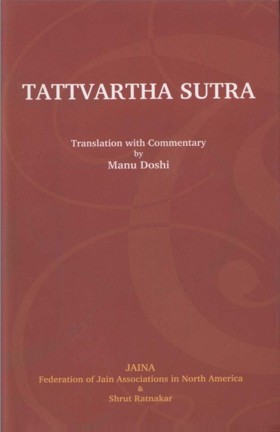09.37 Ājnā'pāyvipāksansthānvichāyāya Dharmamapramattasanyatasya
Audio: Sanskrit: आज्ञाsपायविपाकसंस्थानविचयाय धर्ममप्रमत्तसंयततस्य ।
और यह धर्म ध्यान अप्रमत्तसंयत में संभव है।Hindi: आज्ञा,अपाय, विपाक और संस्थान की विचारणा के लिए मनोवृत्ति को एकाग्र करना धर्म ध्यान है।
09.38 Upashāntkshinkashayayoshcha
Audio: Sanskrit: उपशांतक्षीणकषायोश्च।
Hindi: उपशांत कषाय(मोह) तथा क्षीण कषाय (मोह)गुणस्थान में भी संभव है।
09.37-38
English: Contemplating about Ājnā, Apāy, Vipāk and Sansthān constitutes Dharmadhyān; that arises in the state of vigilant restraint. That is feasible in the stages, where the delusion is overcome or is calmed-down.
Dharmadhyān: These sutras deal with Dharmadhyān. Dharma has several connotations like religion, duty, natural property etc. and can therefore be defined differently. One of the significant definitions is: Vatthu Sahāvo Dhammo, It means that the nature of an object is Dharma. In light of that definition, Dharmadhyān means contemplating about the nature of soul. In other words, the contemplation that leads to self-realization is Dharmadhyān. Sutra 37 states that it can be resorted to in following four forms.
- Ājnāvichay: Ājnā means commandment and Vichay means to ponder over. Ājnāvichay therefore means to ponder over the precepts and commandments of the Lords. Their precepts mainly relate to the inherently blissful nature of soul, impact of Karma on the worldly soul and the way to get free from that impact. Contemplating over those precepts is therefore termed as Ājnāvichay.
- Apāyvichay: Apāy means distress or unhappiness. Apāyvichay therefore means pondering over the causes of distress and unhappiness: One needs to contemplate that distress and unhappiness arise on account of unwholesome Karma, which is acquired by indulging in craving and aversion. Such contemplation can help in refraining from undertaking anything that would result in unhappiness. Apāyvichay is thus helpful in exercising Samvar and Nirjarā (prevention and eradication of Karma).
- Vipākvichay: Vipak means fruitfulness. Vipākvichay therefore means to contemplate that each type of Karma extends its consequence. The law of Karma is supreme and inexorable. No one is immune from its operation. We come across comfortable or uncomfortable situations depending upon the types of Karma. In comfortable ones we feel happy and elated and therefore crave to perpetuate the same. In uncomfortable ones, we feel unhappy and miserable and hence seek to avert the same. We should really make use of the comfortable situations for undertaking the virtuous activities and in adverse ones we should think of not repeating the unwholesome activities. That type of contemplation is termed as Vipākvichay.
- Sansthānvichay: Sansthan means the universe. Sansthānvichay therefore means contemplating about the universe. Jeev and Ajeev (soul and lifeless matter) are the constituents thereof. Among the lifeless objects, Pudgal is the most significant, because the worldly life arises from its interaction with soul. Contemplating about such interaction and its impact on soul constitutes Sansthānvichay.
These sutras state that Dharmadhyān is feasible in 7,h to 12th stages of elevation. The Digambar version of the text, however, specifies its feasibility from 4th to 7th Stages.
 Acharya Umaswati
Acharya Umaswati
